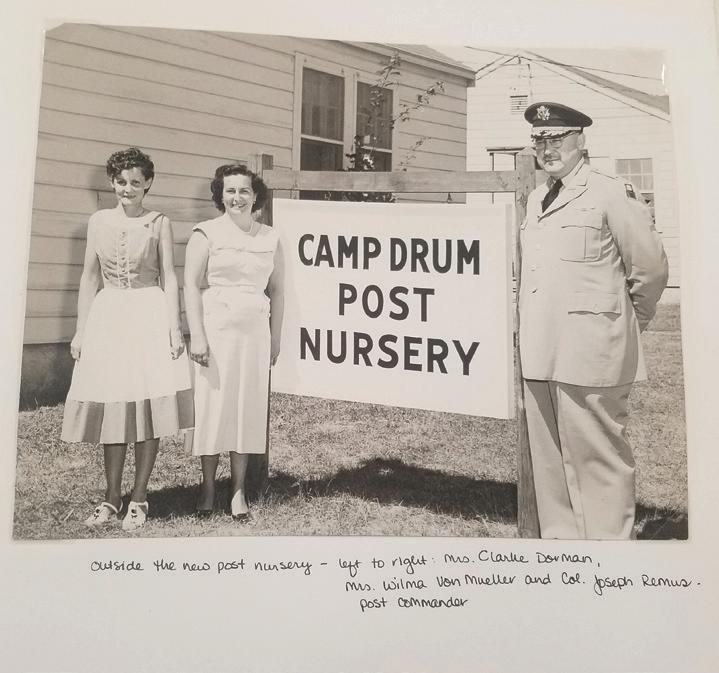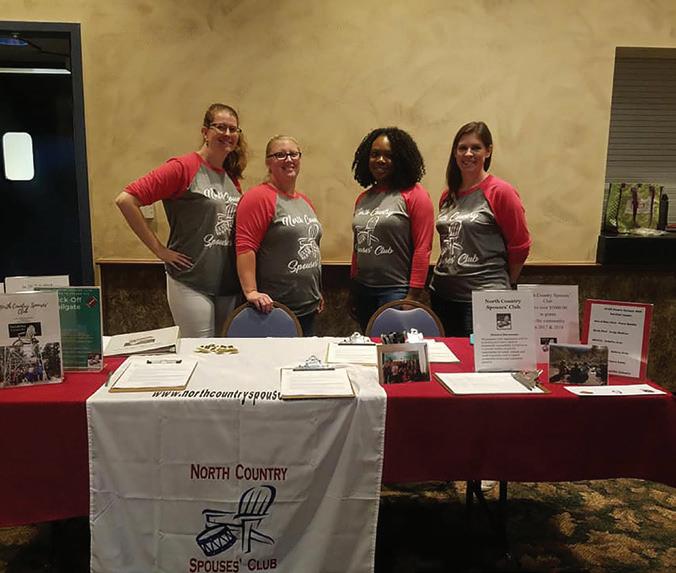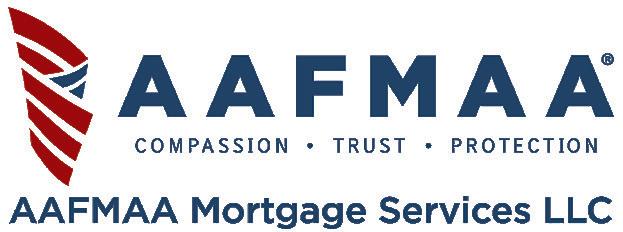

APRIL 2019 SPECIAL RELOCATION ISSUE FROM COAST-TO-COAST MARINE CORPS FAMILY EMBRACES BASE LIVING TIDY UP YOUR FINANCES IN 2019 TEAM MILLIE MODERNIZES HOW WE MOVE The free USAA PCS Guide Visit USAA.COM/PCS or call 800-531-8521 USAA means United Services Automobile Association and its affiliates. ©2019 USAA. 249255-0419 A STEP BY STEP GUIDE TO MAKE YOUR MOVE EASIER. S:7.4” T:7.875” B:8.375” MAGAZINE by AMERIFORCE MEDIA, LLC

Dear Reader,
Allow me to introduce myself: I am AmeriForce’s new associate editor.
The center of how I often define myself is as a writer. It started with me penning short stories as a child, scribbling angsty poetry as a teenager, graduating with a B.A. in Writing, to finally earning a Creative Writing master’s diploma. I have also traveled the world, realized I am not cut out to be a middle school P.E. teacher, wrangled horses in Southern California’s mountains, and been a dedicated volunteer at USO Guam.
I’m also an immensely proud pet parent to a mostly-blind-but-loveable German Shepherd dog, Phoebe. And, I’m the proud spouse of an active duty Naval aviator.
One of my favorite parts about Military Families magazine is that everyone putting it together has some close connection to the military, whether they are active duty, a veteran, a spouse or have a family member relation. That alone gives each design and article a lot more love than other mainstream magazines, because every word and placement comes from our hearts. I am honored to be a part of this group of passionate people.

I look forward to growing with you, and uncovering topics that are pertinent to our niche community in the world.

Thank you,
 Maddie Dolan
Maddie Dolan

www.militaryfamilies.com 3 From the Editor
On the Cover
The Sword family enjoy outdoor activities in their base community.
APRIL 2019 SPECIAL RELOCATION ISSUE FROM COAST-TO-COAST MARINE CORPS FAMILY EMBRACES BASE LIVING TIDY UP FINANCESYOUR 2019IN TEAM MILLIE MODERNIZES HOW WE MOVE This advertisement prepared by DO NOT PRINT REVIEW FOR CONTENT ONLY, NOT COLOR. Round 01 SpotColors: B1122991803 QUAD1 - AFFAIRS Client: USAA Military Affairs Bleed: 8.375” 1.25” Layout DPI: Color: 4CPTrim: 7.875” 1” Location/Event: Campaign: Issue: 2019 Product/Item: Newsprint Effective DPI: DPI Safety: 7.4” x 0.625” Created: 1-10-2019 3:48 PM Modified: 2-13-2019 3:24 PM Scale: 1” 1”w Job#: 249255-0419 Studio #: File Name/ Location: PDG_Saatchi & Saatchi:USAA:[Agency]:Saatchi:ENTERPRISE [007387]:PRINT:249255-0419 PCS Guide Cover Strip:DOCUMENTS:249255-0419_PCS-Guide_CoverStrip_Magazine_7.875x1_01.indd Studio: James Du Pubs: PCS Guide PublicationNote:Guidelineforgeneral identification Do insertion The free USAA PCS Guide Visit USAA.COM/PCS or call 800-531-8521 USAA means United Services Automobile Association and affiliates. ©2019 USAA. 249255-0419 A STEP BY STEP GUIDE TO MAKE YOUR MOVE EASIER. S:7.4” S:0.625” T:7.875” T:1” B:8.375” B:1.25” MAGAZINEby MEDIA,AMERIFORCE LLC
Photo by Dana Arnold Photography.
by Marla Bautista
Cautionary Advice for Shipping
by Maddie Dolan
Military Families Magazine by AmeriForce Media, LLC, is published 12 times a year for active duty service members and their families. Copies are available through participating family service centers, relocation offices, transition offices, base lodges, libraries, daycare centers, MWR activities and other locations by request.

Unit distribution requests can be made online at www.AmeriForceMedia.com/ mf/print-magazines/
Individuals can order a free digital edition of this issue at www.AmeriForceMedia.com/ mf/subscribe-free/
Editorial comments can be emailed to Editor@AmeriForceMedia.com
Military Families Magazine is published by AmeriForce Media, LLC, Bloomington, Indiana, a private company. Information and advertisements in this publication do not constitute endorsement by any branch of the military or the Department of Defense. No part of this publication may be copied without the express written permission of the publishers. AmeriForce Media, LLC, the publishers, and publisher’s agents make no endorsement of any advertised services or products and none should be inferred.

EDITORIAL AND PRODUCTION
President and Publisher Todd Taranto
Managing Editor Bianca M.Strzalkowski
Associate Editor Maddie Dolan
Design Open-Look Business Solutions
ADVERTISING
PLEASE CALL 703-337-8100
Todd Taranto
Publisher
Todd.Taranto@AmeriForceMedia.com
Julie Miller
Vice President, Sales

Julie.Miller@AmeriForceMedia.com

Brian Dunbar
Director of Business Development
Brian.Dunbar@AmeriForceMedia.com
Ursula Hirschhaeuser
Germany Sales +49 (0) 69-15053980
Ursula.Hirschhaeuser@AmeriForceMedia.com
AmeriForce Media, LLC
400 West 7th St. #233 Bloomington, IN 47404
www.AmeriForceMedia.com
4 www.militaryfamilies.com 14 Meal Planning for Busy Families by Kara Ludlow, RDN 15 3 Things to Consider Before Getting a VA Home Loan by Rick Maines 16 Tidy Up Your Finances in 2019 by Andia Dinesen 18 Privatization of Military Moving System Imminent by Andrea Downing Peck 24 The Stress of Moving with Multiples by Tiffany Lawrence 28 Military Spouse Takes Crossfit Passion Overseas by Rebecca Alwine 8 PCSing to a New School by Tricia Ross 10 Family Embraces Base Living from Coast to Coast by Maddie Dolan 12 Are Spouse Clubs Still Relevant? by Marla Bautista Columns 6........ Got Your Six 30.... By the Numbers
Printed in the United States. ©2019 AmeriForce Media, LLC
Contents
Overseas
Pets
26 Team MILLIE Modernizes the PCS Move 22

A military wife has designed an app to help organize the unpredictable nature of military life.

Organized Chaos, designed by Ashton Reagin, is a customizable digital planner that acts as a tool for everything from relocations to parenting to resources.
“The Organized Chaos app contains everything a military family needs to make the overwhelming manageable. Since military spouses are never without their phones, as it’s their lifeline to their deployed spouse, it made sense to create an app where everything they may need is in the palm of their hand,” Reagin said. App features include:

• Populated checklists pertinent to the military life
• Date countdowns (a must have for spouse homecomings and military moves)
• Valuable resources and exclusive access to a diverse community of military spouses providing support and guidance on how to thrive in the military lifestyle
• Stacked, Ribbon Rack Builder ™
• Permanent Change of Station (PCS) Portal
• Dashboard to personalize the look and feel of your app
Visit https://projectorganizedchaos.com to download the app.
6 www.militaryfamilies.com
Andia Dinesen
is the Executive Vice President for Communications and Operations at the Association of Military Banks of America (AMBA). She is a graduate from Northern Arizona University with a Bachelor of Science degree in Psychology. Andia has relocated with her family to nine installations since 2000 to include two overseas assignments.
Andrea
is a freelance writer, Accredited Financial Counselor® and retired Navy spouse from Bainbridge Island, Washington. She received her accreditation as an AFC through the FINRA Military Spouse Fellowship program.

Kara Ludlow
is a longtime Navy wife and mama to three energetic kids. She is a Pacific Northwest-native currently living the California dream in sunny San Diego. As a Registered Dietitian Nutritionist, she reads cookbooks like juicy novels and is usually thinking about what’s for dinner.

APRIL 2019 SPECIAL ISSUE
Rick Maines
the Inside Sales Manager for AAFMAA Mortgage Services LLC, and works to help military families achieve the American dream of homeownership. Rick grew up in Arlington, Va., the son of an Air Force veteran, and served in the U.S. Army after college at the University of Virginia. Rick began his career in the Real Estate Industry as a Relator and Residential Real Estate Appraiser, and then shifted his focus on Residential Loan Originating.

Rick currently lives in Fayetteville, N.C. with his wife, Melanie and their four children (Eric, Ross, Melanie and Riley).
Tiffany Lawrence
has been married to her marine for over 10 years and they have two beautiful twin girls. She is a freelance writer and a Certified Parenting Strategist. As the founder of Covered Cubs, she specializes in helping parents fiercely protect their kids & trust their instincts. Tiffany loves to take an adventure in a good book, get lost in a warm hug, and dance in the kitchen with her family.
Tricia Ross
is an Army wife and mother of three. She is the published author of My Thoughts Abandoned, released in 2017. Marla is the co-founder of The Bautista Project, a custom décor and apparel company, which uses a percentage of their profits to provide for homeless communities.
Rebecca Alwine
is a freelance writer, Army wife and mother of three. Over the past 12 years, she’s discovered the joys of coffee, lifting weights and most of the menial tasks of motherhood. When she’s not writing, she can usually be found hiding behind the sewing machine or with her nose in a book.

is a longtime advocate of literacy for today’s military children. As a Navy wife of 18 years, she covers topics of education, careers, and military life. She earned a B.S. in Behavioral Science and an M.S. in Human Services.



T.T. Robinson
is a freelance writer, editor and speaker. She is the founder of Humans on the Homefront and author of the New York Times Deployment Diary. She is a graduate of Harvard’s Leadership in Crises Executive Education program, something that has proved super helpful as the mother of two young children.


Contributors www.militaryfamilies.com 7
Downing Peck
Marla Bautista
PCSing to a New School
By Tricia Ross
Military kids move on average six-to-nine times during a parent’s career so at some point these tips will come in handy. Being organized and knowledgeable about the new school can set your student up for success before the first day of school even comes. Here’s where to start with your planning:
Before the PCS. Check out the area that you are moving to. Depending on the location, you may be living on or off base and your child’s school options may vary. School ranking sites don’t paint the full picture of what a school or district is actually like. Reviews from parents and former students can help to shape the image of a school but don’t always reflect theactual experiences and education students are receiving.
If your student has anIEP or 504, make sure to discuss at your last meeting of the year that you are moving and to where. IEP and 504 standards may vary by district and state. Arriving with an IEPor 504 that you are comfortable with will help with the transition and will prepare you for the 30 day review that will happen at the start of the new school year.
Know your rights. Public education policy and curriculum varies from state to state and having the facts can prepare you for most situations.
The Military Interstate Children’s Compact Commission (MIC3) was created to level the educational playing field for military connected students. It is an agreement between all 50 states to provide consistent education and enrollment policies for military-connected children in every school district.The Compact addresses
The Ross family have become seasoned experts at transitioning across duty stations with eight PCS moves under their belt. Tricia Ross offers a look at what has helped her four children settle in at each new location.

key educational transition issues that military families frequently encounter; such as enrollment, placement, attendance, eligibility and graduation.
School Liaison Officers (SLO) serve as the primary point of contact for school related matters at military installations. Their job is not only to help parents navigate the local school system, but represent, inform, and assist commands in all matters school related. They work to forge partnerships between the military and schools and can be found at most military installations around the world. If your installation doesn’t have one, then chances are one from another installation is assigned to help in your area.
Military Child Education Coalition (MCEC). MCEC is an organization dedicated to supporting education issues affecting military-connected children. They provide materials, programs, support, scholarships and more for military connected students and schools. If you are moving to a non-military area, MCEC is a great resource for school district officials to learn valuable information about military connected students.
[Check out MCEC’s school withdrawal/enrollment checklist: https://www.militarychild.org/ upload/files/MSTC%20MSTA/School_ Withdrawal_Enrollment_Che.pdf]
Create your child’s student portfolio. A student portfolio is a student’s educational life story. The portfolio does more
thanshare transcripts and highlight achievements, it should include:
• A photo of your student
• Work samples and report cards
• Standardized test scores
• Transcripts
• Syllabus and course descriptions of high school credit classes
• Parent/Teacher conference documentation,
• Life event notes (deployments, separations,significant events)
New school information. Before you go, be informed. Most school districts provide valuable information via a website. Many even have a tab for new students which includes information on registering your student, school office hours, bus information and upcoming events as well as school year calendars.
Get involved.While registering your student, ask for the school’s policy on parent volunteers. Let the office know you’re interested in volunteering. Join the parent teacher organization. Show up to all the events at school you can.
If you don’t hear of any volunteer opportunities, ask the librarian, they always need help shelving books.
If you and your service member show them a positive attitude about the upcoming move and new beginnings, your student will follow your lead – include them in as much of the planning and research as possible so they can feel in control of a situation that often feels out of control.
8 www.militaryfamilies.com Ask the Expert


geico.com | 1-800-MILITARY | Local Office Some discounts, coverages, payment plans and features are not available in all states, in all GEICO companies, or in all situations. GEICO is a registered service mark of Government Employees Insurance Company, Washington, D.C. 20076; a Berkshire Hathaway Inc. subsidiary. © 2018 GEICO
With each Permanent Change of Station, a family is uprooted from its network including schools, volunteer opportunities and friends. One military family has found their transitions less painful, though, with the help of military housing.

TO Coast Coast Family Embraces Base Living from
By Maddie Dolan
Sponsored Content
10 www.militaryfamilies.com
Photo credit to Dana Arnold Photography
Chief Warrant Officer 2 Duran Sword and his wife of 14 years, Angela, have lived in Lincoln Military Housing neighborhoods at several duty stations — Camp Lejeune, N.C., Twentynine Palms, Calif., and now Hampton Roads, Va. — and would not have it any other way.

“It’s usually convenient,” Duran Sword said. “I usually work on the installation or right near it. Where I work, where the kids go to school, and where we live is all within a three mile radius.”
Angela Sword adds that when they move into a new neighborhood, playgrounds, clubhouses, numerous community events, and private social network groups provide a common meeting ground to connect with people. The Swords do not have the sense of loneliness sometimes associated with military families.
“They have a great community,” Angela Sword said. “We all have the same thing in common when we move into base housing: We have a spouse that is in the military and some of us have children. Whether it’s new people moving in or a changeover, everybody seems to be really friendly.”
The benefits of living in base housing for the Swords start with security — having their two children be able to ride bikes and walk to the school bus stop without worry because of ongoing patrols — but also for the ease of access to activities and events. The couple says that they take advantage of every community event that is offered, whether it be for their children, their whole family or them as a couple.
“What’s awesome is that they incorporate everything in the area,” Angela Sword said. “It’s not like they stick to putting up bounce houses and having a little community playtime in the park. They get residents out into the city and show them different things that are in the area.”
With all the events being free to
residents, the Sword family has been able to experience things they never otherwise would have including going to American Hockey League and Minor League Baseball games, visiting an aquarium, and having date nights in town.
“At Twentynine Palms, Lincoln would have their events in the middle of the base, and the officer and the enlisted [families] would meet at a designated area for the event. They had an Easter egg hunt for the kids. They brought in snow for the kids in the wintertime. They brought in reindeer and a Santa that gave out gifts,” Angela Sword said.
She adds that the events are catered to everyone, whether they have children or not, or simply want to network with other spouses. Volunteering is also a major aspect of the Swords’ lives, which is another aspect of Lincoln’s events that provide the community with opportunities to connect.
“Lincoln puts on a program every month,” Duran Sword said. “They have an event, or they have something for neighborhood to do. They try to build comradery among the neighbors. So we take advantage of those events.”
Plus, the amount of activities to do aside from events keep them busy, like going to the pool during summer months to playing video games at the community center. And then there are the added benefits of included utilities, basic lawn care, and on-staff maintenance crews should anything go awry.
“You don’t have to worry when something breaks. You can call the maintenance line, and the guy is there either that night if it’s an emergency or the next day. If not, they hire a company out in town to fix it,” he said.
Duran Sword remembers one time when the base-wide power went out for an extended period of time, and how responsive Lincoln was to making sure all residents were being taken care of. The company provided them with generators, coolers, ice, charging stations, and round-theclock meals, at no cost to them.
“Lincoln is always there, whether it’s the events, the house, or whatever,” he added.
The Sword family faces an international move where Lincoln Military Housing is not available, and they are admittedly sad to leave the organization behind. It has brought them close to other families, to the communities they’ve moved to, and to the staff members that become friends to them.
“When you move, it’s hard saying goodbye to them because you formed a relationship with them, you build trust with them, and you know if you have an issue you can go to them,” Angela Sword made sure to add. “They are looking out for your best interests. They grow to love your family; you grow to love them.”
www.militaryfamilies.com 11
Visit Lincoln Military Housing to learn more about its locations and amenities.
Are Spouse Clubs Still Relevant?
By Marla Bautista
As the term “military spouse” evolved away from the stay-athome mother profile, one might think spouse clubs are no longer relevant. But they are.

Spouses’ clubs emerged from the older school version of these social gathering places, traditionally known as wives clubs. These groupsare now filled with spouses of all genders, branches and ranks, coming togetherto create a sense of community and cultivating positive relationships on a military installation. It is also a place that offers events and activities for a range of interests.
The need for comradery and positivity among military families is still significant due to ongoing deployments and constant field trainings. In fact, one of the top issues identified in the Blue Star Families annual survey is the amount
of separation still being felt by the force. The findingsgo on to state that a sense of belonging is still unmet for today’s families.
“I do find spouses’ clubs to be relevant and necessary,” Shaylyn Purcell, president of the Fairchild Spouses’ Club in Washington, said. “It’s true; it’s much easier to make friends now thanks to the wide reach of social media, but I consider it extremely important to get out, connect with people on a more human level — possibly people you never would have met otherwise — and participate in volunteer work.”
Spouse clubs give people a sense of belonging.
Each year, spouse clubs hold an election to fill executive positions on the board, which offers members a sense of purpose and builds upon

skill sets they already have. The clubs also host fundraisers, luncheons and sub clubs. Sub clubs are smaller groups that host social activities such as cooking, hiking, book club, Bunco, and even beer and wine club. Even moreso, money raised from club events go toward community grants and scholarships for military dependents. Every dollar raised by a spouse club goes right back into its community.
Spouse clubs are known for community service, on- and off-post. Many participants might even say that one of the most fulfilling aspects of being a member is having the chance to give back to the local community. Plus, some installation spouses’ clubs, like North Country Spouses’ Club at Fort Drum, N.Y., reimburse childcare fees when a spouse volunteers.
12 www.militaryfamilies.com Spouses’ Corner
Kristen Thoennes, president of the Shaw Spouses’ Club in South Carolina, said, “We decided to join North Country Spouses’ Club board members.
These clubs are a longstanding tradition within the military spouse community, evolving as needs change.
the town’s Chamber of Commerce for more networking opportunities. It has been nice to have another outlet to share our social events and fundraisers. We try to attend their monthly networking events often to meet other businesses. Relationships are super important when it comes time to asking for donations or learning about new opportunities to give back and serve.”
A local spouses’ club also helps people stay informed about local military happenings and traditions. Through the clubs, people are in the know about things affecting military families on and around their post.

These organizations have alsobeen instrumental in fighting for the betterment of all spouses. Many clubs have initiated change and demanded action on issues affecting military communities all over the world.

Because military life is better with friends.
There is a comfort in knowing that when you PCS there is a set place to go for information and connections. Spouse clubs exist around the world and are filled with others who can offer insight into your new duty station. There are events not only for the military spouse, but for active duty
members as well when they are invited to special events, like date nights.
The entire goal of spouses’ clubs is to cultivate a community. Being with a group of people, outside of family, who understand each other’s lifestyle, and who welcome one another’s love and frustrations is something people may not experience in the civilian world. Making friends helps military spouses successfully get through deployments,
undergo a Permanent Change of Station, or navigate Murphy’s Law when everything that can go wrong, will. Military spouses do not have to navigate their lives alone.
Military spouses can find their nearest spouses’ club by visiting their post’s community service center, contacting the FRG or searching online using the post location with the phrase “spouses’ club.”
consult an attorney for advice regarding your individual situation. We invite you to contact us and welcome your calls, letters and electronic mail. However, contacting us or transmitting information to us does not create a contract or an attorney-client relationship. Please do not send any confidential information to us until such time as an attorney-client relationship has been established. We do not represent you and cannot act as your attorneys unless and until we have agreed in writing to do so. You should be aware that in most cases there is a statute of limitations – a deadline imposed by law that limits the time you have to bring a lawsuit.
the extent Smith, Gildea & Schmidt, LLC is required to designate a principal office and/or a single attorney responsible for this attorney advertising, Smith, Gildea, & Schmidt designates Michael Paul Smith, Smith, Gildea & Schmidt, LLC 600 Washington Ave, Suite 200, Towson, MD 21204. Did You Serve in Active Combat From 2002 to 2015? Are You Suffering From: Hearing Loss? Tinnitus? If You Used Dual-Ended Ear Plugs Please Contact Us (833) ARMY-EAR ARMY-EAR.COM
You should
To
Spouse clubs offer members the opportunity to participate in activities and network with others at the installation. (From right to left: Stephanie Henderson, Marla Bautista, Jennifer Griffith, and Amanda Nguyen.)
Busy Families Meal Planning for
By Kara Ludlow, RDN
If you’re looking to get your life organized this year, why not start with the family dinner table? Military families often have unpredictable schedules with service members working late or odd hours, if they are home at all. Meal planning is one way to keep a consistent routine in place and give you some sense of control in the midst of an alwayschanging, possibly chaotic lifestyle.
If you aren’t already a seasoned menu planner, consider these financial and health-related benefits:
• Planning ahead and knowing what’s for dinner lowers the chance of a last-minute takeout run.
• Making a list and sticking to it saves money at the grocery store.
• Having a plan for leftovers reduces food waste.
• A posted menu gives everyone a heads-up and time to prepare for weekly meals, usually leading to fewer fusses from kids.
• Studies show that children who eat with the family at the table perform better in school, have improved relationships and feel a greater sense of belonging and security.
What are you waiting for then?
Let’s do this!
Meal planning requires setting aside a few minutes at the beginning of the week to determine a dinner schedule that works for your family. Take into consideration outside activities, work commitmentsand days when your slow cooker needs to do the heavy lifting.Save complicated meals for when you have more time to invest in the kitchen.
Budget
While not always popular, determining a weekly food budget is key to meal planning and a

good practice for family finances. Whether you decide on $125, $150or another amount per week is up to you, and will likely take some trial and error to nail down. Shopping at the Commissary is typically the best money-saver when it comes to groceries, but if you live near Costco, Trader Joe’s, Aldi, or other discount grocery store, you could certainly stretch your food dollars there.
The Pinterest hole
Where do you go when beginning the search for dinner recipes? Pinterest, of course!Stay focused, though, because you know how easy it isto start scrolling through chicken recipes and an hour later find yourself sucked into home decorating websites.
Theme nights
To help narrow your dinner choices, it’s easiest to think in terms of categories or themes for each night of the week and plug inmeals accordingly.
For example:
Sunday: Monday: Tuesday: Wednesday: Thursday: Friday: Saturday:
Slow Cooker: Pulled Pork
Soup/Entrée Salad: Cobb Salad
Mexican: Tacos
Pasta: Lasagna
Leftovers
Pizza
Anything Goes: BBQ Chicken
Maybe you love salmon and want to build in a weekly seafood night. Or perhaps you are skilled at cooking with Asian flavors and want to work that in regularly. Go for it! The key is that you have some scaffolding to build from. Build in a day or two for leftovers and enjoy the freedom, knowing that you already put in the work.
Bringing family dinners back
Meal planning is more than just putting food on the table. It’s about creating a predictable rhythm in the home that provides security for the whole family. And it doesn’t have to be fancy. Incorporate some of your kids’ favorite meals and take suggestions before you set the weekly menu in stone. Or chalk. You won’t be able to please everybody each night, but over time, family members will understand that pizza night is just around the corner. Once you get the hang of weekly meal planning, the days of scrambling around the kitchen looking for something to call dinner each evening will be a thing of the past.
14 www.militaryfamilies.com Health
3 Things
to Consider Before
Getting a VA Home Loan
By Rick Maines
When looking for a new home, many military families set out with a checklist of desired features such as more bedrooms for a growing family, extra counter space in the kitchen, or a larger backyard to enjoy. Having a checklist for your finances during the home-buying process is just as important, which includes selecting the right mortgage.

A VA home loan is a popular mortgage option for many service members and veterans. These loans are provided by private lenders, such as banks and mortgage companies, but a portion of the loans are guaranteed by the U.S. Department of Veterans Affairs (VA) leading to more favorable terms and financial benefits.

Are you eligible?
Most active duty military members, veterans, reservists and National Guard are eligible for the VA loan benefit. In addition, unmarried spouses of military members who have died while on active duty or as a result of a service-related disability may also qualify. Before you are approved for the loan, however, you will need to provide a Certificate of Eligibility (COE), which you may request during the pre-approval process with your lender.
What are the advantages?
Once your eligibility is established and you are approved for a VA loan, you may take advantage of these benefits:
Limited-to-no-down-payment: One of the most attractive features of a VA home loan is the ability to purchase a home without requiring a down payment. Some areas do have a borrowing limit, however, and you may have to provide a down payment if the home you’re interested in exceeds this limit.
No private mortgage insurance (PMI): Another advantage of the VA Loan is that it does not require PMI. Many conventional loans with less than 20 percent down require PMI to protect the lender if the borrower stops making payments on the loan. Without this
All loans subject to credit approval. This is not
See a complete list of licenses and disclosures
added expense, VA borrowers can afford to buy more home.
Reused VA loan benefits: Once your original VA loan has been paid in full, or if you use your entitlement to rent out your first home, your VA loan benefits can be applied to purchasing an additional home without a down payment. Just be aware that if you need to use your VA loan benefits again, your funding fee may be impacted.
Refinancing options: The VA loan can be refinanced, which provides you with more options to obtain a lower interest rate if rates drop in the future.
What is the main difference?
The funding fee is the main difference between other types of low-down-payment loans and a VA loan. Traditionally, the VA loan costs less, although a one-time funding fee is required. The amount of the fee is determined by the amount of the down payment and the type of veteran, so you’ll want to do your research before making a decision.
The best way to know if the VA loan is the best option for you is to speak with a licensed mortgage professional. They can discuss the different mortgage options available and ultimately decide which loan is best for you and your family.
www.militaryfamilies.com 15 Sponsored Content
(AMS) is an Equal Housing Lender. NMLS #1423968.
a commitment to lend. AMS is licensed in 17 states.
www.aafmaa.com/mortgage.
Disclaimer: AAFMAA Mortgage Services LLC
at
Here are three things to consider when deciding if a VA loan is right for you:
2019 Your Finances in Tidy Up
By Andia Dinesen
Ahhhh, spring is in the air. Or at least it feels that way in many parts of the country. This seasonis a great time of year to follow the ageold sayingof “out with the old and in with the new!” Netflix’s latest phenomenon, “Tidying Up with Marie Kondo,” has everyonecleaning out every drawer, closet and room in the house. It’s time to do a little of the same with your finances.
Here’s three easy steps to tidy up your finances this year:


Tip 1
Get it all out in the open
Much like Marie Kondo’s suggestion for how to sort through clothing, you should find every piece of financial information you have from debts and savings and put it all in one place for review. You may want to use a net worth worksheet to jog your memory about accounts you may have forgotten about.
If you are married, or financially tied to anyone else, try this exercise with your spouse or partner. The net worth worksheet can also help you plan. If your net worth (liabilities minus assets) is a negative number, you may want to focus your goals on paying down debt.
More on net worth worksheets: https://www.investor.gov/sites/default/ files/Net-Worth.pdf
Tip 2
Track
Now that you have a full picture of what your finances look like, you can take a good look at your daily, weekly and monthly spending. Tracking your spending is the best way to do this, and it can be done inone of two ways:
1 Start on a specific date and track everything you spend for 30 days; or,
2 Take a look back at the last 30 days so you can review your spending and organize it into categories.
Use an expense tracking sheet to help you. Many people prefer Excel documents, and two great examples exist at:
https://www.vertex42.com/ ExcelTemplates/expense-tracker.html
http://www.mediashower.com/ img/2238/simple budget template.xls.
Money
your spending.
16 www.militaryfamilies.com
There are also a multitude of apps that help with tracking, such as Wally, Mint, Mvelopes orYNAB–standsfor You Need A Budget. Tracking your spending leads to the next step of budgeting.


Tip 3
Budget for and set goals.
Tracking where your money goes should lead to a spending plan or budget. Whatever you decide to call it, the end goal should be that you need to decide where you want to spend your money.
For example, if you track your spending for 30 days and realize that in one month you spent $200 on eating out or $400 on shopping (for non-essentials) and those amounts are not how much you would like to spend, then you should adjust your spendingto your budget.
This is also where goals come in handy. If you have a goal of paying down debt or saving for a purchase, then adjusting your budget may free up some money to put toward those goals.
TIP: MilitarySaves.org has some great goal-focused plans to help get you started.
There are many useful ways to cut corners, spend less and make more. Share ideas with your friends. See who can save the most on get-togethers and parties. Start a couponing club. Groceries are a huge expense and getting together to share coupons can make it a fun way to save money. After all, think of all the possibilities this year can bring by freeing up money for things that will really spark joy.

www.militaryfamilies.com 17
What is one financial goal you have set for 2019?
Privatization of Military Moving System Imminent
By Andrea Downing Peck
The 2018 military moving season earned the unwelcomed distinction of being the “worst ever” as military families flooded social media with horror stories of household goods moves gone wrong.

Kerry Nichols was one of those voices. Nichols’ final military move occurred last May after her husband retired from the Army. He had accepted a job at Seymour Johnson Air Force Base, necessitating one last permanent change of station, from Belton, Texas, to Raleigh, N.C.
“We’ve had some bad moves, but this one went out with a bang,” Nichols said.
Damage to their household goods included a ripped leather sofa, love seat and fabric sectional, a crushed bed sideboard and headboard, shattered dishes, a damaged antique phone and bridal portrait — both of which were boxed with garage items — as well as holes in walls and a damaged driveway. Their damage estimate totaled $14,330.
“We didn’t realize until we got our stuff in North Carolina how awful
it was,” she said. “I think the reason our move went so bad is we had this trifecta of horrible. The packers were horrible, the movers on the other end (Texas) were horrible and the movers here were the absolute worst movers I have seen in my entire life.”
Eight months later, they had yet to receive a reimbursement.
“I don’t know how they can do this to people,” said Nichols, who in February lamented that the claims inspector who arrived at their house months earlier had inspected only three items because no other damage was noted on his list.
The Defense Personal Property Program, managed by the U.S. Transportation Command, is searching for ways to avoid a repeat of last year’s ragged peak relocation season that runs from mid-May to Sept. 30. At the top of their list is a move to privatize the military moving system. This proposal, announced in February, would result in the Defense Department hiring a commercial personal property transport company to manage the roughly 420,000 shipments authorized each year. TRANSCOM’s goal is to unveil a privatized system by the start of the peak summer moving season in 2021.
18 www.militaryfamilies.com Relocation
TRANSCOM officials argue privatization would lead to improved “accountability and transparency.” Plus, TRANSCOM says other claims reduction initiatives are underway including:
• Crating more household goods shipments. As of mid-January 2019, household goods shipments are being crated if they meet specific criteria like a move more than 800 miles, an estimated weight of 3,000 pounds or less in non-peak season and 7,500 pounds or less in peak season, do not have a direct delivery address at time of booking or upon acceptance of shipment, and do not include extra-large items unable to fit in a standard container.
• Changing Defense Transportation Regulations to increase quality assurance inspections of PCS shipments. The new standard will require that no less than 50 percent (with an overall goal of 100 percent) of all inbound and outbound personal property shipments to be inspected. As service branches ramp up to this new requirement, the physical inspection rate was 25.2 percent for December 2018 across all military branches.
• Publishing moving company satisfaction scores, although specific details about it are not yet known.
• Rolling out in May a 24/7 hotline available to any DOD member experiencing issues with any aspect of their household goods moving process.
• Piloting a new online personal property customer moving portal, called MilMove (My.Move.mil), that would replace Move.mil.
• Introducing a standardized training manual for use by personal property personnel in all service branches.
If this spring’s reform efforts improve the moving process, military families may have Army veteran and military spouse Megan Harless to thank. Harless brought widespread media attention to the current state of military moves when she posted an open letter to elected officials last August on her blog, “Military Spouse Chronicles,” that included a link to a petition to the Secretaries of the Armed Forces and Congress.
Harless challenged military leaders and members of Congress to hold moving companies accountable
Committee sent a similar letter.
Harless now finds herself at the tipof-the-spear as a recognized voice for military families demanding an improved PCS system. She serves on an informal TRANSCOM advisory board that includes Movers Association and Storage Warehouse Association representatives and other key transportation officials. Harless says the panel is discussing ways to improve the PCS process for both transportation providers and military families, but was not asked to weigh in on the privatization proposal. Harless also has made the rounds in Washington, D.C., meeting with congressional leaders and second lady Karen Pence’s office to bring them first person accounts of the problems plaguing military moves.
Military and transportation officials have cited a nationwide shortage of truck drivers and other moving personnel such as packers and loaders for the delays, communication problems and quality issues many military families experienced during last summer’s moving season.
for the damage they cause to possessions and the heartache they bring to families.
The petition gained nearly 105,000 signatures and created a ripple effect that drew the attention of Army officials and Montana Senator Jon Tester’s office. Tester ultimately joined with senators Lisa Murkowski, R-Alaska; Tim Kaine, D-Va.; and James Lankford, D-Okla.; in writing a Sept. 27, 2018, letter to TRANSCOM calling out the “mismanagement and inefficiency” of PCS transportation service providers and is demanding a written report by March 30, 2019, providing answers to more than a half-dozen questions they raised. The House Armed Services
When Harless posted her Open Letter on her “Military Chronicles” Facebook page, she was inundated with comments from military spouses and service members who described their own dreadful moving experiences. She also received some pushback from former military spouses and veterans working in the military transportation industry.
Air Force veteran David Shelton, who works as an over-the-road driver with Suddath United, took issue with the blanket criticism of the moving industry on social media that followed Harless’ Facebook post. He contends many of the problems with damage during military moves can be traced to
www.militaryfamilies.com 19
“local agencies,” which handle the pack out and warehouse storage near bases.
“Uncle Sam is at fault for two reasons,” Shelton said, who also grew up in a military family. “Trying to move everybody in a threemonth period instead of spreading it out during the year. If little Johnny and little Suzie have to miss a couple of weeks of school, it was OK back in the day when we moved. It is OK today.”
“The military is at fault for that and picking the local agencies to do the packing,” added Shelton, who maintains the DOD need to provide better oversight over the local moving companies it uses.
Army Maj. David Dunn, spokesman for TRANSCOM, states the number of claims military personnel filed in 2018 was “comparable to claims date for the past three years” and on par with the moving industry average. In 2018, the DOD authorized 334,324 household goods and unaccompanied baggage shipments, with 49 percent of CONUS shipments door-to-door and 51 percent storage-in-transit. Only 33 percent of overseas moves were door-to-door.
“The annual claim rate for household goods shipments is 21 percent,” Dunn said in an email. “This number is consistent with the industry average (non-military claims). The average amount per claim is $2,692, comparable to the past three years.”
Karie Wallace, general manager for Arrow Moving and Storage in San Antonio, has seen all sides of the moving industry, first as a military spouse and then as an employee in office, operations and management portions of the business. While
she acknowledges some military members experience bad moves and improvements need to be made to the PCS process, Wallace maintains, “Not every moving company is horrible. There are always three sides to every story. A, B, and the truth lies somewhere in the middle.”
Wallace points out the DOD holds moving companies and crews accountable for damage to shipments.
“When they say we’re not held to a higher standard, we pay for those [damaged] items. The company does or the crew does,” Wallace explained. “When a claim comes through on an item, it gets deducted out of the employee’s paycheck if we can prove they were at fault. They are held to a standard and they know if they don’t treat the furniture well, they are paying for that furniture.”
Shelton and Wallace both maintain military families also can take steps to improve the PCS process. Here are some of their tips:
• No matter how often you’ve moved, review PCS tutorials at Move.mil and look over additional moving information at Military OneSource’s website and from your local Personal Property Processing Office to ensure you understand your entailments and DOD regulations. Know what items need to be disassembled and reassembled by the homeowner.
• Clean and tidy your house before movers arrive. Make sure all clothes, dishes and other items to be packed are clean. Throw away garbage.
• Leave open self-packed boxes so movers can verify items are packed properly.
• Make sure high-value inventory form is filled out and boxes with fragile and high-value items are labeled clearly for loaders. Ask drivers to provide extra moving pads for high-value items.

• Get your truck driver’s name and contact information and communicate with the driver throughout the moving process.
• Complete the Customer Satisfaction Survey.
Relocation
20 www.militaryfamilies.com
While You Serve Your Country, Let Us Serve You Associates Understand Overseas Military Lifestyle Services Designed for U.S. and Overseas Banking Dedicated Locations in U.S. Military Communities Help with Your Personal Financial Needs Talk to an associate today or visit DoDCommunityBank.com to find out more Community Bank is operated through a contract between a commercial financial institution and the Department of Defense. Currently, the contractor is Bank of America, N.A. The Defense Finance and Accounting Service, in coordination with the Military Service banking representatives, is responsible for oversight of Community Bank. Bank of America, N.A. Deposits are FDIC insured. © Bank of America Corporation. WELCOME TO YOUR COMMUNITY BANK
Team MILLIE Modernizes the PCS Move
By T.T. Robinson
It’s hard to imagine, but it wasn’t that long ago that military families didn’t have the convenience of the internet to help them navigate the great unknowns of military life. Instead of emails, couples mailed letters, waiting weeks for them to arrive. Texting was just a dream, FaceTime unheard of, and the closest thing to a social network was an oft-outdated address book. While it might be romantic to think of spouses pining for their other halves across the Pacific and checking mailboxes every day, it’s nearly unfathomable to think about moving to a new location without Google, Facebook, and one of our very favorite PCS resources: MILLIE. We sat down with Army wife and MILLIE’s chief operating officer, Kellie Artis, to talk about how MILLIE is changing the PCS landscape.

Getting ready to PCS? Connect with MILLIE online at www.GoMILLIE.com or through Facebook at https://www.facebook.com/groups/themillieway. 22 www.militaryfamilies.com Relocation
How does MILLIE work?
From the day the detailer starts throwing out locations to the day you close on your house at your new duty station, MILLIE guides you through each step.
“Let’s just for the sake of a timeline, assume you’re PCSing in the summer, as that’s when most military families move,” Artis explained. “So, in January or February you get an idea of where you’re heading. You can come to our website and find your duty station in our list. We have base installation guides for over 70 installations across all branches including the Coast Guard. There you’ll find background information on the climate, culture, commute and big things you need to know. For example, in our DC guide we talk about traffic. We don’t want you to experience culture shock after you get to a location. We want you to be able to think through different things and have realistic expectations of things like neighborhoods and housing price points and spouse employment as you’re making the decision about where you want to live.”
And the installation guides are structured similarly. Artis shared, “We started to see patterns in communities. We had focus groups of military spouses at different locations and we got really good at asking the right questions. For example, we’d ask, ‘Where are the cute, charming houses with no garages and peeling walls?’ and that’s how we find our historic districts or older homes.’ The base guides are codified in a manner that every military spouse craves: simple, organized and with enough details that you can formulate ideas, but not so many details that you’re overwhelmed.
AgentHero
So you’ve read the base and installation guides, now what? You need a place to live. While Artis recommends a house hunting trip, she recognizes that with the burden of childcare, a hotel stay, airfare, meals and even just time , it can quickly become prohibitive.
MILLIE has an answer for that.
If you’re looking to buy, you can partner with an AgentHero: a hand-picked real estate agent that is either a veteran or a spouse, who understands firsthand what military families need during a PCS. They get the timeline, the VA loan – all of it –because they’ve been there.
Boots on the ground
Not ready to buy and don’t want to rent sight unseen? Enter the scout program.
“They are your boots on the ground,” Artis said. “You can hire a military spouse to go do things for you for a much smaller fee than you’d pay to take a trip.” For example, your Scout can do a FaceTime walk through of your house.
Artis elaborated, “Sometimes listing photos don’t do a property justice. You want to see the inside of a closet, or make sure it doesn’t smell.” A scout can be your eyes, ears (and nose!) in a property without you having to get on a plane.
The scout program is how Artis found MILLIE in the first place.
“I had a rental property in North Carolina and was living in Virginia,” she recalled, “and I had to let a painter in. I had just fired our property manager because I thought I could do it myself, but I had to drive from Virginia to Fayetteville just to open a door.” She had plenty
of friends in North Carolina but didn’t want to inconvenience them. Ultimately, she wanted to be able to hire one of them for an hour.
Artis shared her situation on social media and someone forwarded her a job application as a scout. The more research she did on the company, the more she wanted to work for MILLIE. Although she swears her only “expertise” was posting on her own Facebook page, Artis applied to be their social media manager.
“Fortunately, they hired somebody else,” she laughed, “but in my application I wrote, ‘Hire me. I want in. I believe in your mission and I’ll learn any job you give me.’” And so they did. Artis was hired to build content, which she’s done through the base and installation guides and her contributions to the MILLIE Journal.
As the company grew, so too did her role. Artis now serves as the chief operating officer, and she is just as excited about the company today as she was in that initial application.
“I wake up every day knowing that we are making a difference in military families’ lives. When you work alongside such passionate veterans and spouses with common goals, it doesn’t feel like work,” she said. “It feels like family. We are passionate about easing the pain of PCS.”

www.militaryfamilies.com 23
The Stress of with Moving Multiples
By Tiffany Lawrence
Since 1992, the month of April has been chosen as a time to bring awareness to things that cause stress and to also show the negative effects it can produce.
While stress is a very common trait of military life, many of us mask our emotions and just deal with it, because we realize it’s our normal.
Comes with the territory right?
One common event that can ignite massive amounts of stress is the big PCS move.
“The military is moving you? You’re lucky! You don’t have to do anything!”
Statements like this made by civilians push us even harder to suck it up because we feel like we are complaining. In reality, though, the military doesn’t do everything, and we are still affected by the change and the impact it makes on our individual family dynamics.
Personally my most stressful moving experience was our first PCS as new parents to twin baby girls.We were traveling overseas from Okinawa, and relocating back to the states.
We were a sight to see! There are not enough words to describe how much stuff we had to keep handy. We needed bags on bags to hold all of the bottles, baby food, diapers, extra
clothes (for everyone) and toys just to name a few things.
Let’s add one more thing to that pile… We missed our flight.
The result is that we had to pay out of pocket for new flights and totally readjust our flight schedules because we could no longer make our previous connecting flights. My husband felt the pressure of the responsibility, and I felt the stress of having to take care of everyone. A day later, after diligently trying to keep the girls entertainedduring the wait, we boarded our new flight and settled in our seats.
On this overseas flight I just wantedsleep. Unfortunately one of our daughters decided to spend her time crying while the other slept peacefully with her daddy. We switched, and it continued.The other baby cried on me while the other half of our family slept peacefully. I was so jealous of my husband’s calm demeanor because I know they were probably feeding off my tense energy.
Next up, we had to go through customs. We trekked through the line with all of our luggage and two car seats. While my husband handled those heavy items, I handled the girls, the stroller and the plentiful bags we had on our flight. Ihad no sleep for 14 hours and I felt like my breaking point was close.
Relief came for a bit at the USO.
When we made it to our final destination I was so happy that it was over and I just wanted to sleep. The stress of the previous couple days had been extremely hard. But there were a few bright spots that had they not existed, I don’t know how we would have made it.
For any new parents of multiples who are about to PCS, here’s how to make your trip a little less stressful:
Ask for help. I cannot stress how important this is. When we missed our flight, we were able to stay with some friends who volunteered to take us to the airport.
When we arrived in the states, our entire family was there with WELCOME BACK signs held high, ready receive us and help us get settled.
Double check your travel itinerary. In other words, don’t miss your flight. We misunderstood the arrival time. Our seats had been given away to Space-A participants.While I was caught up with packing, I didn’t take the time to look at our travel itinerary. Although my husband had it, there was a lot going on and another set of eyes may have made all the difference. We were partially reimbursed for the purchase of our commercial tickets.
Expect to be frustrated. In general, moving involves a lot. Things can go wrong. And even if all goes as planned, taking care of kids while you’re uprooting and relocating isn’t easy. Also factor in the personality of your spouse.
By expecting some degree of frustration, you save a little bit of grace for yourself and others and it makes dealing with your circumstances just a tad bit easier.
The older our girls have gotten, the easier traveling became for this mom of multiples. They are little veterans at it now, and my stress levels are lower because they can carry some of their own load.

24 www.militaryfamilies.com Parenting
Tiffany’s twin girls during a PCS move.
 By Maddie Dolan
By Maddie Dolan
A Permanent Change of Station is burdensome, but adding an overseas move and beloved pets to the list stresses a military move to a whole new level. From figuring out country requirements, preparing the animals, and affording the hefty price tag, some people might question if pet ownership is worth it to military families.

“I feel like the first word is stressful,” said Dr. Laura Schultz, owner of CoastView Veterinary Clinic in San Diego and a seasoned Navy spouse who brought two hound dogs on multiple cross-oceanic moves. “We always moved across an ocean. I feel like I was pretty educated about it, but it was still kind of overwhelming and stressful to make sure everything was in order.”
Each country has its own requirements as to what is required for a pet to even begin its journey. From specific microchips, an extensive list of vaccinations, mandatory quarantines, ink-signed health certificates, to a specific timeline to complete requirements, the process can easily become overwhelming to someone already juggling the regular aspects of a move.
Capt. Alecia Agner with U.S. Army Veterinary Corps currently assigned to Andersen Air Force Base, Guam, says she knows firsthand how
stressful a move can be because she brought a Chocolate Lab and a cat to the island.
“When people are beginning to PCS and they find out where they are going,” Agner said, “I definitely think that they need to find the information about the location they are going.”
Finding accurate and up-to-date information can be taxing in itself, too, because not every country is alike. Rabies-free locations like
Hawaii, Japan or Guam may even have more strict requirements than a European country. Plus, airlines have certain conditions as well.
In fact, starting the process long before a family has confirmed orders is something Andrea Fisher, a Navy spouse at Hickam Air Force Base, HI, facing a second move to Spain, is already doing despite being months away from the actual PCS.
“For us, it comes down to try and pre-
Relocation
Capt. Alecia Agner with one of her dogs, Braxxe.
26 www.militaryfamilies.com
plan as much as we can and as far out in advance as we can,” Fisher said.
Both Agner and Shultz recommended that anyone facing a PCS with pets, to utilize U.S. Department of Agriculture’s Animal and Plant Health Inspection Service’s website for the most accurate information available, in addition to reaching out to an Army veterinarian directly.
“You can call the local clinics at the destination that you are going to and they can help facilitate giving you the information,” Schultz said. “Between the Army resources and USDA APHIS, those are two really great things for people to have access to.”
Most importantly, though, Agner urges people to consider if bringing their pets on the overseas tour is the best decision for the family and/ or the pet. She says that families need to recognize several factors like the inherent risk of putting an animal through the stress of being transported, the sizable cost of shipping an animal, and to consider what medical facilities are available at the next duty station and if they are adequate for the animal’s needs.
“Maybe leaving your pet back in the states with a close relative for a few years, while I know the pet is part of the family and you don’t want to do that and it’s gonna be really hard, maybe that really is the best thing for your pet,” Agner said.
Even more so, while Fisher is a self-proclaimed animal lover who will do whatever it takes to ship her
three animals, she said, “You really gotta think hard and long on whether getting the animal is worth it.”

Schultz and Agner advocate for responsible pet ownership, regardless of the circumstance, but point out that military families have more to consider when thinking about adopting a pet. Civilian families might not need to consider the stresses on the animal or the family when accommodating them into a PCS.
“I think it is important for them to consider the fact that they are in the military when they consider bringing on animals,” Schultz said.
“You’re never going to get rid of military families having pet,” Agner added. “You’re not gonna get rid of any population of families having pets. It’s part of the culture, honestly. But I think that we have to take more things into consideration and be responsible in aspects that other people wouldn’t have to.”
Start preparing the animal(s) for the move long before receiving paper orders. Abundant time is key in having a successful, stressless move with pets.
Use USDA APHIS’s website as a starting point to understanding requirements, and reach out to the U.S. Army Veterinary Corps for further help.
Be aware of the cost. Save in advance for the veterinarian bills and shipments to and from the country.
Prepare all pets for travel by crate training them to reduce the stress of a move. Practice traveling with them in a car, and work with a trusted veterinarian to find a solution to help make pets comfortable.
Do not adopt a pet if you cannot financially or physically care for them in the event of a PCS. Always be aware that an international move is a possibility, even if remote.
Do not hesitate to lean on the military community or family for help in extreme circumstances. Financial aid resources and fostering organizations are available to help, too.
www.militaryfamilies.com 27
Andrea Fisher’s daughters with their three pets that have accompanied them at several overseas duty stations.
Military Spouse Takes Crossfit Passion Overseas
By Rebecca Alwine
It’s Friday night and Mitch Wagner is surrounded by the things that make him happy. He’s lifting heavy weights with a friend while his wife looks on. There’s a class full of athletes of varying abilities, working on their own skills, while pausing every few minutes to see what Wagner is lifting. There’s encouragement, there is hard work and there is support.
CrossFit is a community, one that Wagner has leaned on the past few years. In August 2013, Wagner started CrossFit and since then, he’s lived in three states and changed gyms at least as many times. Throughout the past five years, Wagner has relied on the same coach from Invictus Fitness.

“Having a coach that knows you and knows your body makes a big difference,” Wagner said. “They know you, your recovery speed, how you lift, how you move. They become a part of your family.”
On the outside, it may look like Wagner is just another competitive CrossFit athlete. He has a home gym, loads of T-shirts from the CrossFit competitions he’s been a part of, and his Instagram feed has action shots of him competing

in places like Dubai. But training isn’t all he has on his mind.
“Some days I just want to go home from work and play with my dog,” he said.
Almost two and half years ago, Wagner married his sweetheart and now he follows her across the country as she pursues her career. She’s a periodontist in the U.S. Army, which has moved from them from Oregon to Georgia. They’re now at their second duty station, which has given Wagner the chance to figure out his career path.
With a degree in finance from Oregon State University, Wagner has the eccentric resume one would expect from a military spouse. Before moving from Oregon, he worked for Nike as an assistant product line manager for men’s training apparel — a job he loved.
“Working with marketing training equipment was fun,” he said, “and the perks were great.”
After moving to Fort Benning, Ga., he discovered there wasn’t a lot available in the finance world, so he spent the time coaching CrossFit and doing personal training. Upon moving to Fort Gordon, Ga., he began working as an implementation specialist at ADP and has his sights set on a job on the nearby installation.
Wagner takes his role as a military spouse seriously, striving to be as supportive and flexible as possible.
“The military has impacted my CrossFit career positively and negatively,” he said. “We’ve met a lot of amazing people — lifelong friends, really — I’ve gained experience competing across the country. And it’s been hard to move so far away from my coach and figuring out training during the stress of moving.”
28 www.militaryfamilies.com Fitness
Since joining the sport in 2013, Wagner has competed in the CrossFit Open each year, earning a spot in regionals. Four years of regionals across two regions has given him experiences he wouldn’t trade for anything. This year, though, CrossFit announced a lot of changes, one that did away with regionals, the competition Wagner historically did his best in.

“I’m not sure what next year will look like for me competitively,” he said. “It’s going to be harder to compete with the changes in format.”
This year, there are over a dozen sanctioned qualifying events, increasing the demand on the athlete’s time, money and body. It makes the sport more expensive, pushes the need for sponsorships and overall makes it harder to juggle family and a job with training. Like with each year before, he’ll take it all in while making the decision, looking to his wife for her blessing before committing to a competition.



One of the positive things the last year brought was the opportunity to compete internationally in December. Wagner’s coach pushed him to complete the online qualifiers for the Dubai CrossFit Championships. He placed well, so he took advantage of that and flew halfway across the country to compete.
Wagner’s wife went with him and joined a slew of other Invictus athletes, the coaching staff and family members. “I didn’t do as well as I wanted, the swim was a rough event to start with,” he said. But he says he fought back with
each event and finished middle of the pack of elite men.
Following Dubai, Wagner’s plans include competing as a team in the Mid-Atlantic CrossFit Championships held in the District of Columbia in April, and in Austin, Texas, for the Fittest Experience in May. Those events, combined with the Open which takes place late February through March, are what’s on the
schedule so far. The rest is up in the air.
Until the next CrossFit competition, find Wagner balancing life and training day in and day out. Before and after work, he’ll be at the gym, working out an average of three to four hours a day. He’ll also be coaching a class at CrossFit Stars and Bars or Greenbrier Fitness, where he’s known for his love of country music and his no-nonsense, do it anyway attitude.
www.militaryfamilies.com 29
DIG DEEPER. GO FURTHER. ONLINE Top-ranked degrees 30+ graduate programs 25+ undergraduate degrees ecampus.oregonstate.edu/military
Albert Diaz B.S. in Computer Science U.S. Navy veteran
BEST WAYS DOD CAN IMPROVE QUALITY OF LIFE: 1 2 3
Better housing options/ increase BAH
Adequate manning levels and reduce OPTEMPO
More military career control
MILITARY FAMILIES ALSO LONG FOR COMMUNITY BELONGING
48% SAY THEY DON’T BELONG IN LOCAL CIVILIAN COMMUNITY
30 www.militaryfamilies.com By the Numbers
by
FIVE ISSUES IN THE EYES OF MILITARY SPOUSES: Amount of time away from family Impact of deployment on children Military spouse employment military pay/benefits Dependent children’s education 51% 39% 45% 35% 42% 10,192: the number of respondents Get full survey results online at https://bluestarfam.org/survey
2018 MILITARY FAMILIES LIFESTYLE RESULTS presented
Blue Star Families TOP


DOWNLOAD OUR RESOURCE FULL OF DOZENS OF TRAVEL DISCOUNTS AND IDEAS. http://militaryfamilies.com/traveldiscounts2019 FREE

MOVE EASIER. A step by step guide to make your Visit USAA.COM/PCS or call 800-531-8521 Membership eligibility and product restrictions apply and are subject to change. USAA means United Services Automobile Association and its affiliates. © 2019 USAA. 249256-0419 FREE USAA PCS GUIDE AND CHECKLIST We have the tools to prepare you for your next PCS. Compare cost of living changes and create a personalized moving checklist. Nobody does more for those who serve. T:7.25” T:9.75”





 Maddie Dolan
Maddie Dolan








































 By Maddie Dolan
By Maddie Dolan










